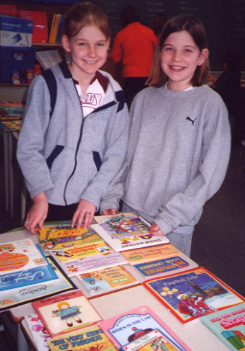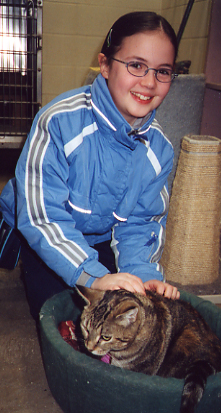 The
Global Education Club
The
Global Education Club The
Global Education Club
The
Global Education Club
"Young people live in a multicultural world where they are exposed to different cultures, religions and ideas on a daily basis. Through mass media, children see poverty, suffering and war every day. They are more aware and more informed than any other generation. What do we do with a generation like this? Do we teach them to become passive bystanders and tell them there is nothing they can do until they're older? Or do we give them opportunities to respond to the suffering they see and teach them to become active and caring adult citizens of the world?" Craig Kielburger, founder, as a child, of youth run "Kids Can Free The Children", Canadian Living, April 2003
Getting Started
Getting started requires one or more adult who care about the world and
kids, and who are interesteed in learning along with eager children. I was interested because I'd volunteered in a developing country.
Kinds of Projects
At the beginning of the year we brainstorm the world's problems and how we
can help. We roughly map out our projects in a year timeframe, matching projects
with key international days (eg. food drive for the Food Bank for World Food Day
in October), and trying to avoid stressful times of the year (eg Christmas and
end of June). We balance awareness activities (inviting a guest speaker to talk
about Islam) with action activities (bake sale to raise funds for endangered
species). We also balance our action efforts between fundraising and others,
such as volunteering to walk dogs at our local S.P.C.A. When we donate money, we
alternate between local, national and international organizations, stressing how
the issues and needs are all linked.
Age
Typically, students grade 3-6 have been the most involved in our school. But
Grade 1-12 works well.
Optional Attendance
Attendance for students is always optional.
Numbers
We've never set quotas on the club. The numbers ebb and flow.
There have been anywhere between 2 and 30 kids at a meeting.
Who Joins?
Gifted students love being able to extend their minds,
creativity, and leadership skills. Students challenged
academically like feeling successful.
 How Often?
How Often?
We meet for the half hour of recess after lunch once a week.
How
We Work Together
The adults
donít
teach or direct;
we
facilitate. All our decisions are make as a group. We sit in a circle, share ideas, and
make decisions cooperatively. We learn together, we teach
ourselves, and then we go and teach others. Adults provide input about which projects
are possible given the time and resources.
Adult Support
We've had one key facilitating teacher throughout the history of the Club, and
sometimes the solo adult with the club. The maximum we've had is two
teachers with the club at a time.
Optional
School Involvement
Other staff and students are invited to
participate in projects. The goal is to educate and involve our whole
school population - staff, students, and parents - along with our community. But
the choice is of course other teachers' as to whether they have time or
inclination.
Recognition
Students are recognized the same way other clubs and sports teams are in our
school, with group photos and year-end awards. Instead of medals our club
chooses a donation by the school in their name to an organization.
Media
Projects are regularly shared with our local newspaper for coverage. Since
our goal is "Awareness and Action", it's important to educate our
local community as well as our school community.
Awards
Through
sharing our Club's successes, they have been nominated for and received several
awards for their work.
Acceptance by adults
When we started 20 plus years ago, sometimes adults were at first unsure of "Global Education"
- what it encompassed, and whether it was something they wanted to support. Some
staff and parents saw Global Education as too value based,
and something that should be done in the home. Sometimes
parents felt we should take care of our own community rather than people on the
other side of the planet.
In our school it helped that we committed as a staff to learning about Global Education in a systematic way for a year before involving students and parents. Over the years our school has built a culture of caring, and of recognizing the greater meaning of educating our students as global citizens. Over the years our School District has picked up this philosophy. Now there are regular district wide efforts to help, for example raising funds for victims of tsunamis, floods or earthquakes.
There has been a constant education of staff, parents and students through low key means. For example, announcing "a Used Book Sale to raise money for planting trees in Africa" over the intercom at school for 3 mornings, educates the whole school community instantly on the issue (deforestation) and the solution (recycling and planting trees). Sending a quick notice home informs parents; a quick notice in the community bulletin in the local newspaper informs the community. It's simple, low-key, and easy for adults and kids alike to support. We've ensured we do a good balance of local, national and international supporting, and help people understand that when we plant trees in Africa, for example, we're improving the air and water systems that affect us too.
Over the years there has been less hesitation, and more other classes and teachers have conducted great projects, independent of the Global Club activities.
Motivation
It's natural for there to be an ebb and flow in
motivation, both the students' and the teachers'. At times the club has met less
often because of that. After a month or two it picks up again. At times the club
has ceased, due to teacher work to rule efforts during difficult contract
negotiations. I and the children really miss the club, and when we start up
again we're very re-energized and committed.
Usually, the club is very energizing and sustaining through the more challenging other aspects of school life. Their enthusiasm and optimism is very contagious and uplifting.
|
The Global
Education Club
Website
E-mail contact: kathleen.cochrane@fmpsd.ab.ca Check out Kitty's other webs at www.kittycochrane.ca
|